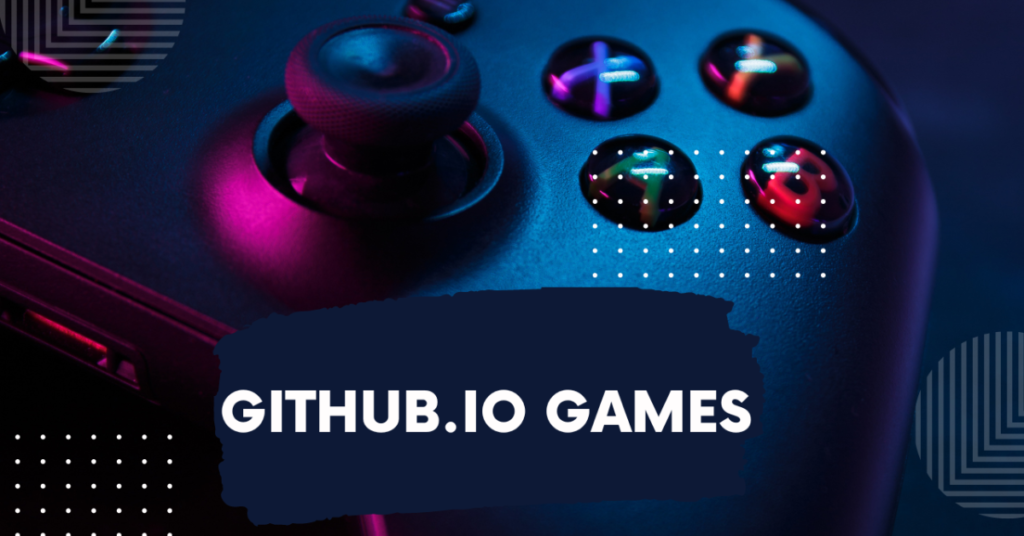GitHub.io games represent an exciting intersection of web technology, open-source collaboration, and creative expression. Hosted on GitHub Pages, these games offer developers an accessible platform to share their creations without the need for paid hosting services. Built primarily using HTML, CSS, and JavaScript, GitHub.io games are easily accessible through web browsers, making them available to a wide audience. This article delves into the world of GitHub.io games, exploring their origins, development processes, and the vibrant community that surrounds them.
Introduction to GitHub.io Games
In recent years, the rise of web-based technologies has transformed how games are created, shared, and played. GitHub.io games exemplify this shift by offering developers a unique platform to distribute their work freely. These games are hosted on GitHub Pages, a service provided by GitHub that allows users to publish web content directly from their repositories. As a result, developers can focus on game development without worrying about the complexities and costs of traditional hosting services.
The accessibility of GitHub.io games is one of their most appealing features. Since they are built using web technologies such as HTML, CSS, and JavaScript, these games can be played on virtually any device with a modern web browser. This cross-platform compatibility ensures that a broad audience can enjoy the games, regardless of their operating system or device type.
The Role of GitHub Pages in Game Hosting
GitHub Pages is a static site hosting service that leverages GitHub repositories to publish web content. For developers, this means that any HTML, CSS, and JavaScript files stored in a GitHub repository can be transformed into a live website with a unique GitHub.io URL. This feature has made GitHub Pages an ideal platform for hosting web-based games.
One of the main advantages of using GitHub Pages is its simplicity. Developers can deploy their games with just a few clicks, without needing to set up or manage a web server. This ease of use makes GitHub Pages particularly attractive to indie developers, hobbyists, and students who may not have access to advanced hosting solutions.
Furthermore, GitHub Pages is tightly integrated with the Git version control system, allowing developers to easily manage and track changes to their game projects. This integration is crucial for maintaining the integrity of the codebase and facilitating collaboration among multiple contributors.
The Open-Source Advantage
GitHub.io games are typically open-source, meaning that their source code is freely available for anyone to view, modify, and distribute. This open-source nature fosters a culture of collaboration and learning within the developer community. By examining the code of existing games, aspiring developers can gain insights into best practices, discover new techniques, and learn how to solve common programming challenges.
The open-source model also encourages innovation. Developers can take an existing game, modify its mechanics, add new features, or even create entirely new games based on the original. This iterative process of building upon previous work accelerates the development cycle and leads to a diverse array of games with varying levels of complexity and creativity.
Additionally, the open-source nature of GitHub.io games aligns with the broader ethos of the web as a platform for sharing knowledge and fostering collaboration. It allows developers to give back to the community by sharing their own creations and contributing to the improvement of others’ projects.
Game Development on GitHub.io
Developing a game for GitHub.io typically involves using a combination of HTML, CSS, and JavaScript. These technologies form the backbone of web development and provide the necessary tools for creating interactive, visually appealing, and responsive games.
HTML: The Structure of the Game
HTML (HyperText Markup Language) is the standard markup language used to create the structure of web pages, and by extension, web-based games. In the context of game development, HTML is used to define the elements of the game interface, such as buttons, menus, score displays, and other interactive components. The simplicity of HTML makes it easy for developers to create the basic layout and structure of their games.
CSS: Styling the Game
CSS (Cascading Style Sheets) is used to control the appearance of the HTML elements in a game. This includes defining the colors, fonts, sizes, and positioning of elements on the screen. CSS can also be used to create animations and transitions, adding a layer of visual polish to the game. By leveraging CSS, developers can ensure that their games are not only functional but also aesthetically pleasing.
JavaScript: The Logic of the Game
JavaScript is the programming language that brings interactivity and logic to web-based games. It is responsible for handling user inputs, controlling game mechanics, and updating the game state in real time. JavaScript can be used to implement everything from simple click-based interactions to complex physics simulations and artificial intelligence for non-player characters (NPCs).
JavaScript frameworks and libraries, such as Phaser, p5.js, and Three.js, are often used in GitHub.io game development to streamline the process and add advanced features. These tools provide pre-built functions and components that can significantly reduce the amount of code developers need to write, allowing them to focus on the creative aspects of game design.
Diversity of GitHub.io Games
One of the most exciting aspects of the GitHub.io gaming ecosystem is the sheer variety of games available. The platform hosts everything from simple puzzle games and retro arcade clones to complex multiplayer experiences and experimental art games. This diversity is a testament to the creativity and ingenuity of the developers who use GitHub Pages as their canvas.
Simple Puzzles and Casual Games
Many GitHub.io games fall into the category of simple puzzles and casual games. These games are typically easy to pick up and play, making them ideal for short gaming sessions. Examples include classic games like Tic-Tac-Toe, Sudoku, and Minesweeper, as well as original puzzles that challenge players’ logic and problem-solving skills.
Retro and Arcade-Style Games
Retro and arcade-style games are another popular genre on GitHub.io. These games often pay homage to the golden age of arcade gaming, featuring pixel art graphics, chiptune music, and fast-paced gameplay. Developers may recreate classic games like Pac-Man, Space Invaders, and Tetris, or design new games that capture the spirit of the arcade era.
Multiplayer and Social Games
While many GitHub.io games are single-player experiences, there is also a growing number of multiplayer and social games on the platform. These games allow players to compete or cooperate with others online, adding a social dimension to the gaming experience. Examples include browser-based multiplayer shooters, real-time strategy games, and even online board games.
Experimental and Artistic Games
GitHub.io is also home to a variety of experimental and artistic games. These games often push the boundaries of traditional game design, exploring new ways to engage players and convey ideas. Some may focus on storytelling, while others experiment with unconventional gameplay mechanics or abstract visuals. These games highlight the platform’s potential as a space for creative expression and innovation.
Collaborative Development and Contribution
The collaborative nature of GitHub.io games is one of the platform’s defining features. Since these games are typically open-source, other developers can contribute to their development by submitting code, fixing bugs, adding features, or even creating entirely new versions of the game.
Forking and Pull Requests
GitHub’s version control system allows developers to “fork” a repository, creating a copy that they can modify independently. Once they have made improvements or changes to the game, they can submit a “pull request” to the original repository. The repository owner can then review the changes and decide whether to merge them into the main codebase. This process facilitates collaboration and ensures that the best ideas and contributions are incorporated into the final product.
Community-Driven Development
Some GitHub.io games are developed as community-driven projects, where multiple contributors work together to create and refine the game. These projects often have dedicated contributors who manage the repository, review pull requests, and coordinate development efforts. Community-driven development can lead to games that are more polished, feature-rich, and enjoyable to play, as they benefit from the collective expertise and creativity of a diverse group of developers.
Learning and Mentorship
For many developers, contributing to GitHub.io games is not just about creating games but also about learning and growing as a programmer. The open-source nature of these projects provides an opportunity for less experienced developers to learn from more seasoned contributors. Mentorship is common in these communities, with experienced developers offering guidance, code reviews, and advice to newcomers. This culture of learning and mentorship helps to nurture the next generation of game developers.
Challenges and Limitations
While GitHub.io games offer numerous advantages, there are also challenges and limitations associated with the platform. Understanding these challenges is crucial for developers who want to make the most of GitHub Pages as a game development and hosting platform.
Performance and Scalability
One of the primary limitations of GitHub.io games is performance. Since GitHub Pages is a static site hosting service, it is not designed to handle resource-intensive applications. Games that require real-time server-side processing, large amounts of data, or complex multiplayer interactions may struggle to perform well on the platform. Developers need to optimize their games carefully to ensure they run smoothly on GitHub Pages.
Browser Compatibility
Another challenge is ensuring browser compatibility. While HTML, CSS, and JavaScript are supported by all modern browsers, there can still be differences in how games are rendered and executed across different platforms. Developers must test their games thoroughly on various browsers and devices to ensure a consistent experience for all players.
Limited Access to Backend Services
GitHub Pages is a static hosting service, which means it does not support server-side scripting or dynamic content. This limitation can be a challenge for developers who want to implement features such as user accounts, leaderboards, or real-time multiplayer functionality. To work around this, developers may need to integrate third-party services or APIs to provide the necessary backend functionality.
Future of GitHub.io Games
The future of GitHub.io games looks promising, as the platform continues to evolve and attract a growing community of developers. Several trends and developments are likely to shape the future of this ecosystem.
Advances in Web Technologies
As web technologies continue to advance, the capabilities of GitHub.io games will expand. Emerging technologies such as WebAssembly, WebGL, and WebRTC will enable developers to create more complex, high-performance games that rival traditional desktop and console games. These advancements will also make it easier to integrate features like real-time multiplayer, 3D graphics, and virtual reality into GitHub.io games.
Increased Collaboration and Community Involvement
The collaborative nature of GitHub.io games is likely to become even more prominent in the future. As more developers join the platform, we can expect to see larger, more ambitious community-driven projects that push the boundaries of what is possible with web-based games. The open-source ethos will continue to foster a culture of sharing, learning, and mentorship, helping to grow the next generation of game developers.
Integration with Other Platforms and Services
In the future, we may see greater integration between GitHub.io games and other platforms and services. For example, developers could integrate their games with social media platforms, online marketplaces, or cloud gaming services to reach a broader audience. Additionally, improvements in API support and web technologies will make it easier to connect GitHub.io games with backend services, enabling more complex and feature-rich games.
Conclusion
GitHub.io games represent a vibrant and dynamic ecosystem within the broader world of web development and game design. By leveraging the power of GitHub Pages, developers can create, share, and collaborate on games without the need for paid hosting services. The open-source nature of these games fosters a culture of innovation, collaboration, and learning, making GitHub.io a valuable platform for both aspiring and experienced game developers.
As web technologies continue to evolve, the potential of GitHub.io games will only grow, offering new opportunities for creativity and collaboration. Whether you’re a developer looking to share your latest creation, a player seeking unique and innovative games, or a learner eager to dive into game development, GitHub.io games offer something for everyone. The future of this platform is bright, and it will be exciting to see how it continues to shape the landscape of web-based gaming.







